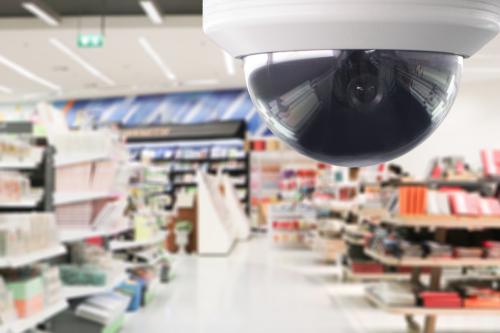Walmart Is Under Fire for Allegedly Doing This to Shoppers

Millions of people across the U.S. choose to give their business to Walmart every day of the year. In return, the company promises to put its customers first—including by protecting the safety of those shoppers. But at least one Walmart customer is now claiming that the retailer is doing the opposite. A lawsuit was just filed against Walmart, alleging that the company is actually putting shoppers at risk with one of its safety protocols. Read on to find out why Walmart is now under fire.
READ THIS NEXT: Walmart and Dollar General Are Under Fire for Doing This to Shoppers.
Walmart uses video technology throughout its stores.

The use of video cameras in Walmart stores has been well-documented over the years. In 2019, the retailer confirmed to Insider that it uses security surveillance cameras in over 1,000 stores to monitor checkouts and deter potential theft in its stores. More recently, former employees have made TikTok videos claiming that Walmart’s security cameras are so high-tech that they can actually zoom in and see exactly what you’re looking at on your phone.
But while Walmart hasn’t verified these specific claims about its extensive surveillance capabilities, it does reference its use of cameras in-store on its website. “We may collect your personal information from technology we use in our stores, such as our facility cameras,” the company states. “We operate cameras in store for security and operational purposes, for example, to help us improve the design of our stores to better serve our customers.”
But now the use of this technology is being questioned in a new lawsuit levied against the big-box retailer.
A lawsuit has called these cameras into question.

A Walmart shopper has filed a new class action lawsuit against the retailer in a U.S. District Court for the Southern District of Illinois on Sept. 1. The suit, levied by plaintiff James Luthe, alleges that Walmart is collecting, storing, and using customers’ biometric data without their consent through their cameras and advance video surveillance systems. “Biometrics are unique physical characteristics, such as fingerprints, that can be used for automated recognition,” according to the U.S. Department of Homeland Security (DHS).
“Walmart’s stores in Illinois are outfitted with cameras and advanced video surveillance systems that—unbeknownst to customers—surreptitiously collect, possess, or otherwise obtain biometric data,” Luthe’s suit states. The plaintiff alleges that he entered Walmart’s stores in the state on numerous occasions in the past three years without being informed that the retailer would collect, obtain, store, and/or use his biometric identifiers or biometric information.
Best Life has reached out to Walmart for comment on the lawsuit, but has not yet heard back.
RELATED: For more up-to-date information, sign up for our daily newsletter.
This alleged practice violates a major law in the state of Illinois.

Walmart collecting, storing, and using customers’ biometric data would violate Illinois law, according to Luthe’s lawsuit. The state legislature passed the Illinois Biometric Information Privacy Act (BIPA) in 2008, which requires “entities, including employers, that collect biometric data to follow a number of protocols,” per The National Law Review. It is still “one of the toughest laws” in the U.S. in regards to the protection of biometric data, according to the law firm Jackson Lewis P.C. Among its key features are the need to let people consent to having their biometric data collected, and clear guidelines as to how that information would be stored and used.
“Walmart does not notify customers of this fact prior to store entry, nor does it obtain consent prior to collecting its customers’ biometric data,” Luther’s lawsuit states. “Further, Walmart does not provide a publicly available policy establishing a retention schedule and guidelines for permanently destroying this biometric data.”
According to Top Class Actions, this law was enacted to protect people’s biometric information. “Unlike Social Security numbers or other data that can be changed if compromised, biometric information is unique to an individual,” the legal news outlet explained. “If a person’s biometric information is compromised, they have no recourse and are at an increased risk of identity theft, the Illinois legislature determined.”
Walmart has previously faced backlash for biometric technology.

This is not the first time Walmart has found itself in the hot seat because of similar technology. The retailer filed a patent application for a “biometric feedback cart handle design” on shopping carts in 2018, which could be used to track things like a shopper’s heart rate and body temperature, RetailWire reported. According to the news outlet, it was referred to as “creepy” and “intrusive” by many customers, and there has been no update on the potential rollout of this technology in the last four years.
More recently in Jan. 2021, Walmart was forced to pay $10 million to some of its employees in Illinois after settling a class-action lawsuit over the retailer’s use of a palm scanning device that collected biometric information, the Chicago Tribune reported. The lawsuit alleged that Walmart had required employees to use a palm scanner to access a cash recycler system without obtaining their written consent from Jan. 2014 to Feb. 2018, when use of the scanners ended at Walmart stores.